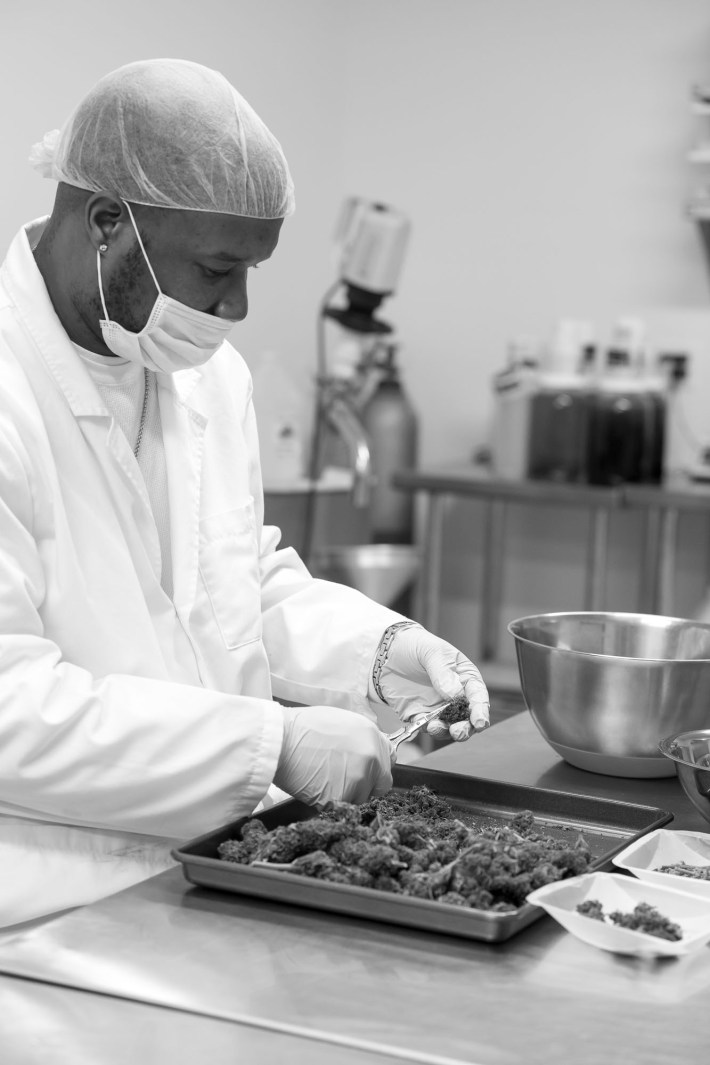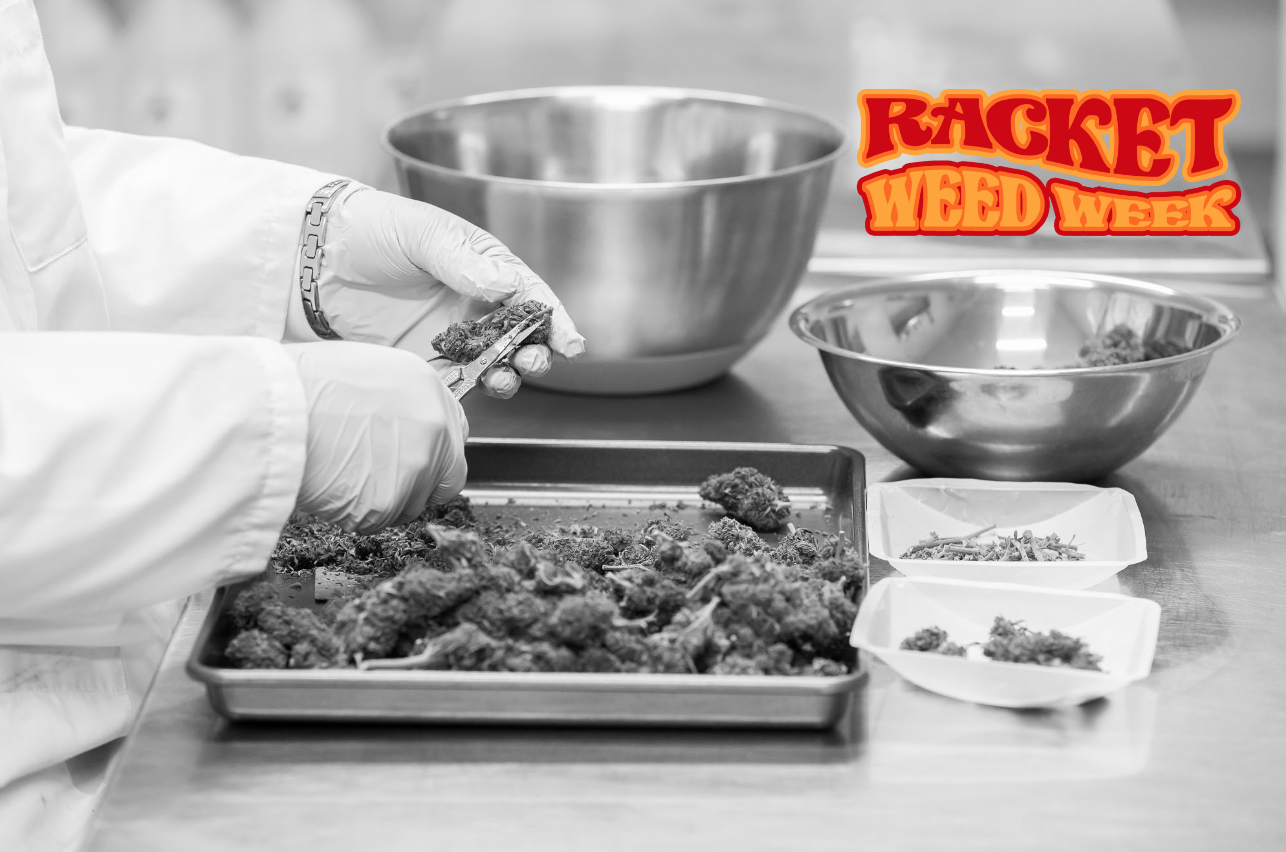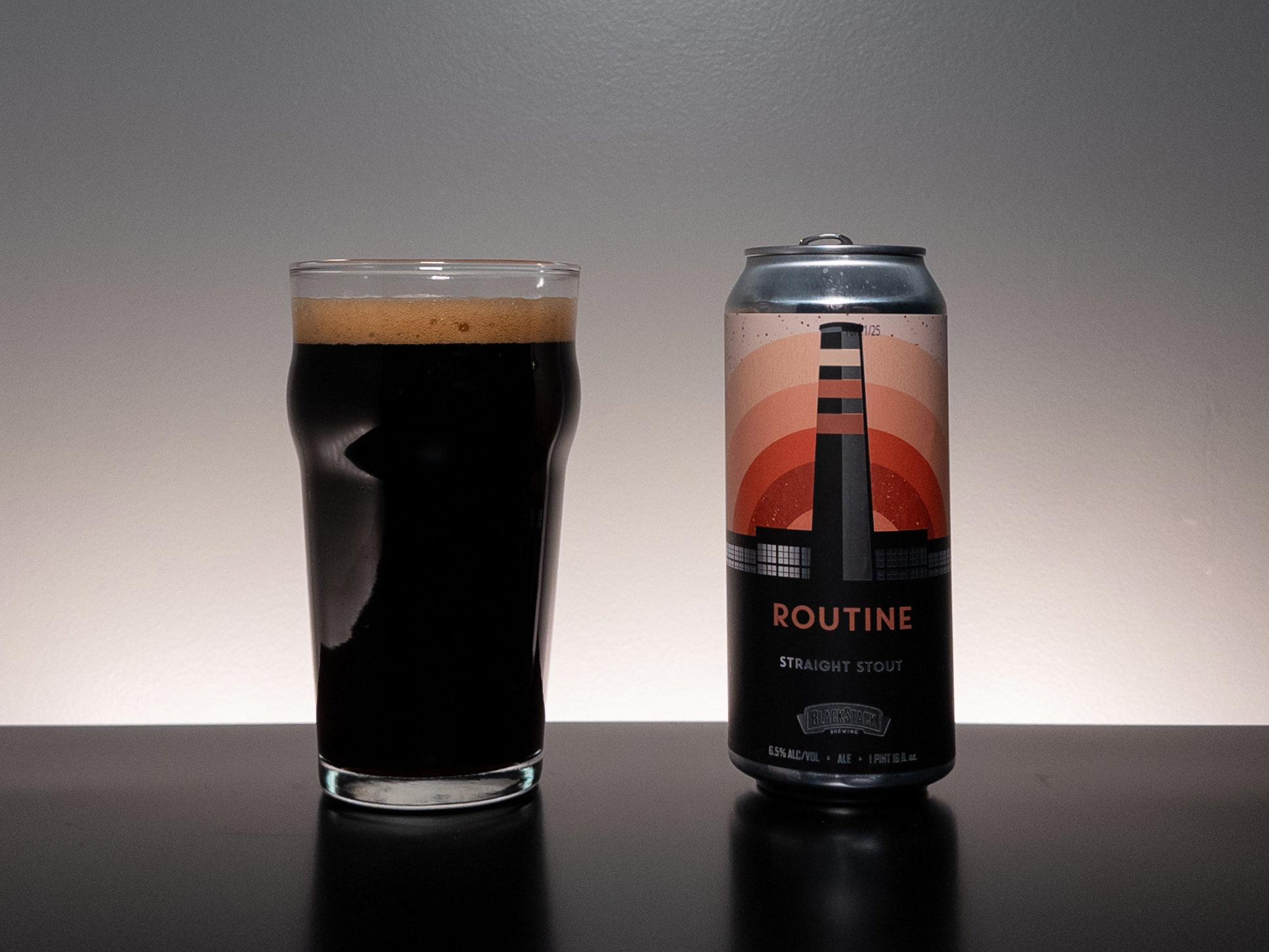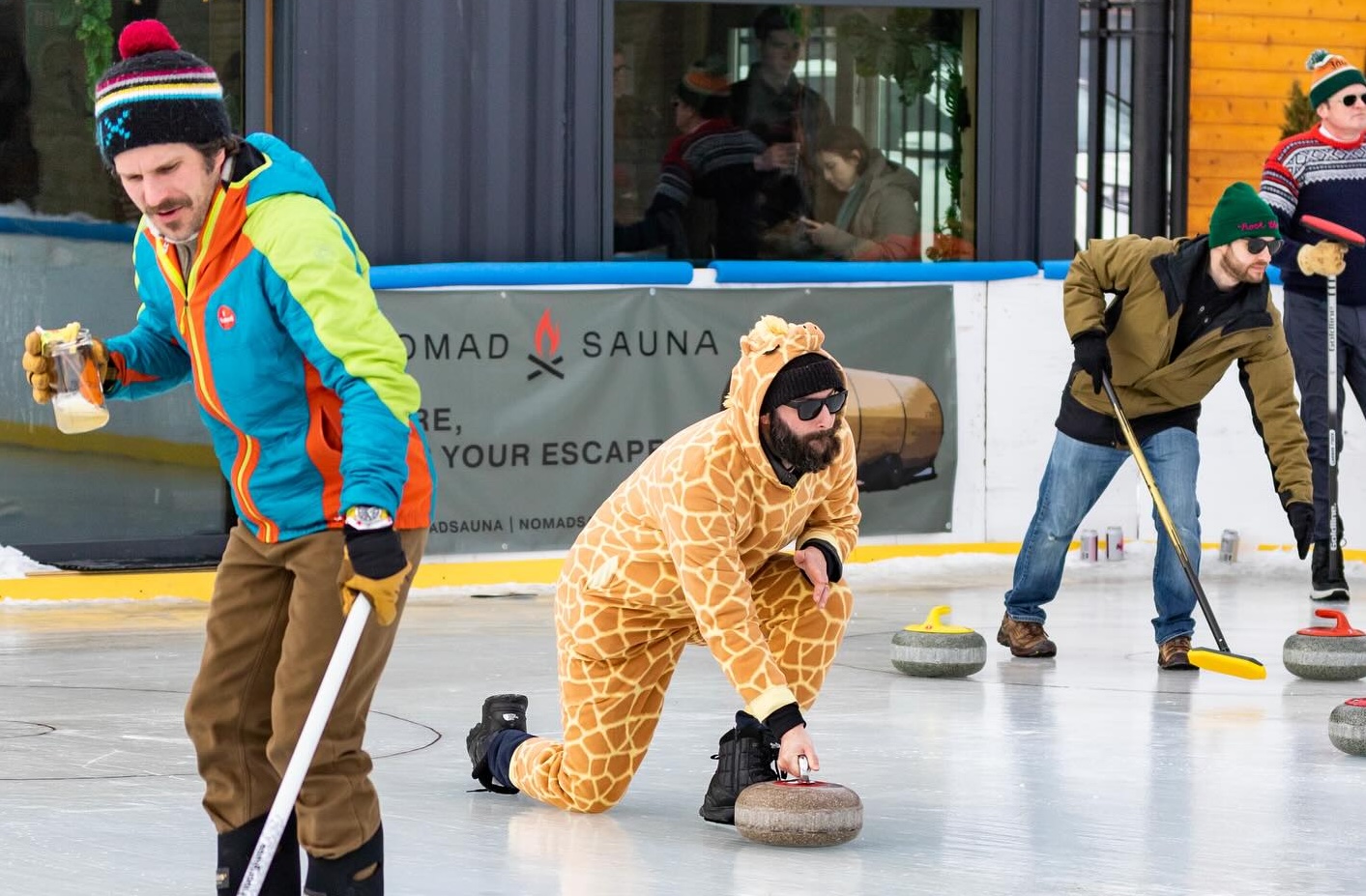For proof that cannabis has gone mainstream, look no further than the Minnesota State Fairgrounds, where this year, among the Pronto Pup stands and tractor brands, you could find a 60-by-35-foot booth housing the Minnesota Hemp Growers Cooperative.
“We sat out there and just talked to people. All day long. I mean, we talked to hundreds and hundreds of people a day,” says Beecher Vaillancourt, a Growers Cooperative board member and managing partner at Minneapolis-based Global Organic Distro, whose house brands include the THC and CBD brand BLNCD Naturals. Some of the folks who approached the booth were in their thirties; some were in their sixties. And nearly all had something to say about recent experiences with THC edibles or questions about how to step into it following the July 1 legalization of hemp-derived edibles in Minnesota.
“That was the demo: everyday people. A lot of people’s parents,” laughs Allison Vaillancourt, Beecher’s partner in life and business at BLNCD (pronounced “balanced”).
BLNCD launched its line of Delta-9 THC gummies in mid-July, not long after the state law OK-ing edibles with less than 5 mg of the stuff went into effect. But the Vaillancourts aren’t new to this market—their business was founded in 2018, one of several that got its start after the 2018 federal Farm Bill legalized the production of gummies, beverages, and other products below .3% THC.
Over the last five years, they’ve been quietly building a mini hemp-ire here in Minnesota. (Very quietly—I was shocked, searching “BLNCD” earlier this week, to find Google returns just four pages of results for the term. Even “Em Cassel” returns 10.) They moved into their current space, a former paper-shredding facility in northeast Minneapolis, about three and a half years ago, where Global Organic produces a handful of different house brands and a number of white-label products.
The Vaillancourts know the lack of regulation in Minnesota is likely temporary. Democrats snuck Statute 151.72, legalizing low-dose hemp-derived edibles, past their GOP counterparts precisely by keeping the rules about oversight and taxation minimal. And though BLNCD’s half-decade in CBD and THC production makes them veterans in an emerging industry that’s growing more crowded following Minnesota’s unusual semi-legalization experiment, they have the same questions as everyone else in the industry: What happens next?
“I think everybody understands: It’s kind of all eyes on Minnesota,” Beecher says.
The last few months have been a gold rush for Minnesota breweries, at least a dozen of which have jumped into the THC seltzer production biz.
Minnesota’s craft THC bubbly market, like the new edible laws in general, is unlike anything else that’s sprung up around the country. Limitations are few (breweries can produce and sell as much as they want), restrictions are minimal (the drinks can’t contain alcohol or more than 5 mg THC), and oversight is essentially nonexistent (the 23-person Board of Pharmacy is not exactly staffed or equipped to manage the influx). As Racket beer writer Jerard Fagerberg wrote for Vice earlier this year, the near-total lack of rules is in stark contrast to the state’s somewhat draconian alcohol laws.
Northeast’s Indeed Brewing was among the first to get its Two Good seltzer on shelves. Founder and CEO Tom Whisenand says the idea really started a few years back, when the brewery started producing an NA CBD drink, though the state eventually told them to cut it out. “We always thought it would be something consumers want, something that would be good for Minnesota as a whole, and something that fits well with our brewery, our culture, our brand,” he says. So this summer, they dusted off the old playbook and launched Two Good almost as soon as the new law went into effect in July.
Whisenand has been fascinated to see how many breweries have jumped into the THC seltzer fray, and blown away by how many consumers have been buying and drinking the stuff.
“From a craft brewer’s perspective… there’s kind of a ‘craft beer’ consumer out there,” he says. “But with THC, and cannabis in general, those lines aren’t really there.” Two Good has gotten a whole new group of consumers, those who might prefer Bud or Coors, to crack a can from Indeed.

Interestingly, the breweries and brands we spoke to for this story were unanimous in their calls for more regulation. “We just want clarity: These are the allowed products, this is what you can do, this is what you can’t do,” says Jason Dayton, co-founder of Minneapolis Cider Co., which launched its Trail Magic seltzer right around the same time as Indeed’s.
There’s not a lot of structure at this point around what’s allowed and what isn’t, which is why you see THC seltzers in everything from 12-oz cans to crowlers depending on the brewery, and why some breweries let you drink seltzers on site and others don’t.
At Minneapolis Cider Co., “We take the approach that you can responsibly serve THC alongside alcohol,” Dayton says, although he notes that another uncertainty is the question of insurance. There are policies out there that cover cannabis consumption, but so far, Minnesota is the only state that’s combined THC and alcohol. No one knows how insurance providers will react to it.
The absence of structure is by design—not getting caught up in the details was how DFLers were able to slip the THC legislation past Republicans—and it’s also likely temporary. Everyone assumes the law will evolve next year. In Richfield, one of a number of cities around Minnesota where the City Council has placed a moratorium on edible sales, it already has.
And as for what that change will look like? “I’ve got a lot of questions, not a lot of answers, a few ideas,” Whisenand chuckles.
“Our plan is pretty much business as usual, full steam ahead,” says Beecher Vaillancourt at BLNCD, noting that nothing will be settled on day one of the upcoming legislative session. He’s among the cannabis producers, doctors, and U of M experts on a number of weekly calls with legislators, trying to determine what the next session will look like and whether there’s room to further the law. “There will be hundreds of bills related to cannabis that hit the floor, and then there will be the ones that stick, and actually have support, and make it to some committees for some conversations.”
Like many, Whisenand wants to see the state create a Board of Cannabis and tax sales of the stuff, which are currently being priced to match states where there’s a tax of 15% to 30%. One study from September found that Minnesota is missing out on up to $46 million in revenue by not taxing legal THC products. BLNCD’s co-founders think liquor stores should be able to sell THC—they’re among the most qualified to do so, they argue, having been checking IDs for years—and they want to see restrictions on dosages loosened.
“Almost all of us had been selling products for therapeutic benefits for the last two and a half or three years, federally legal—Minnesota just put into place their level of restrictions,” Allison Vaillancourt says. And those rules are more restrictive than in many other states. BLNCD still makes 20 mg gummies in 30-count jars: “We just ship them to Wisconsin, North Dakota, and 40 other states instead.”
As Minnesota laws work now, BLNCD could be manufacturing their gummies and seltzers on a kitchen table or in a garage somewhere. They’re not. Their Northeast facility is certified organic, with a food-grade license. In the production space, 26 HEPA filters line the ceiling—that puts their building above medical grade.
“It’s part of the long term, knowing that these are consumer-grade, consumer-ready products,” Beecher says. They wanted to go live with a facility that would never have to slow or pause production, and full transparency lets them feel good about the end result. “This is what we feel standardization will go to at some time… this is our level of standardization.”
“For us, it’s about building this long-term, sustainable category,” says Dayton at Minneapolis Cider Co., noting that Minnesota’s craft beverage industry has a long history of safely making quality products. “Our priority for this legislative session is really maintaining the ability for local beverage manufacturers to be in this space, and do it responsibly.”
And either way, he says they’re all in on Trail Magic—they set their cannabis biz up independently of Minneapolis Cider Co. and ship to people in dozens of states, with the goal of becoming a player in the national cannabis industry.
“We’re four months into this, having served tens of thousands of guests, and have had no incidents,” Dayton says. “It’s a pretty good test so far.”
Outside of total legislative gridlock in 2023, which most producers think is unlikely—this legalization experiment is too weird and wide open to do nothing about—the obvious possible outcomes are that lawmakers either rollback or further liberalize the existing legislation. The midterms will likely impact that outcome, though it’s not as clear as whether the Republicans or the DFL control the House and Senate. Cannabis legalization is popular among Democrats and Republicans and everyone in between. Surprisingly, even though it’s an election year, very few Minnesota politicians have said anything about it at all.
“No Republican I have talked to wants to walk this back,” Minnesota House Majority Leader Ryan Winkler told Polito’s (locally launched!) weed reporter Paul Demko earlier this month. “They know where the public is.”
For now, THC producers have more questions than answers.
“I think, being in this space, you have to be sort of comfortable in the gray areas,” says BLNCD’s Allison Vaillancourt. She says calls for clarity haven’t been limited to Minnesota; the industry as a whole has been pushing for some more guidance from the FDA. “We want to know what we can do and what we can’t do. But as a business, you have to find out where your comfortability of risk is.”
The area is a little too murky for others. At Indeed, Whisenand says they’re all in on THC seltzer—if they feel full recreational legalization is likely in the near-ish future. The way that things are being shipped out of state under the 2018 Farm Bill is still too questionable for the brewery, legally speaking—too uncertain to risk a substantial investment.
So far, Minnesota’s haphazard legalization experiment has gone exceedingly well. There’s been demand, and growth, and people who’ve come out of the woodwork to express an interest in weed. There hasn’t been any of the Reefer Madness-type chaos some predicted. The money stuff hasn’t been as complicated as it has been in other states with legalization—Minnesota has dozens of credit unions, who, seeing the same opportunity as producers, have had no problem banking for cannabis or hemp or marijuana.
“I don’t think there’s a way to put the genie back in the bottle,” Beecher says, “and I don’t think there’s enough justification to do so.” Still, when the Vaillancourts remark on how well the rollout has gone so far, they quickly knock in unison on the wooden table in front of them.
“Nobody’s done it the way Minnesota has,” Whisenand says, “and I think the jury might still kind of be out: Is it kind of ridiculous the way we’re doing it, or is it actually a positive thing? So far, my opinion is that it’s a positive.”







